- Home
- Dusty Richards
The Sundown Chaser Page 3
The Sundown Chaser Read online
Page 3
“You got any cattle to sell?” Shultz asked, riding beside him.
“We have some two-year-old steers that’ll have lots of size by this fall.” Herschel thought about the stock they could sell off his wife’s ranch at the end of the season.
“I like threes better. What’ll they weigh?”
Herschel turned his shoulder to the crosswind to save his hat. “By fall, seven-eight hundred pounds. They’re big twos.”
“Can I go look at them?”
“Won’t hurt. They’re down on Marsha’s home place. They’ve got lots of shorthorn blood in them. Many are out of the second cross away from longhorns.”
Shultz nodded. Cattle buyers were like poker players, they never acted excited. But those Midwest farmers liked to feed out those British crosses much more than they did the old longhorns from Mexico.
The two men rode on a long ways in silence, fighting the wind and the driving rain. When they reached Ramsey’s funeral home on Main Street, Herschel stepped down and shouldered the corpse. He waved away Shultz’s offer to help him and sent him to open the door.
At last inside the building under the heavy load, he removed his wet hat and put it on a tree rack. A young man rushed in and looked shocked at him carrying the dead man.
“Let me take him, Sheriff Baker.”
“No, you lead the way. I’ll need a coroner’s report on his death, so we need to lay him out back there.”
“Who is he? The dead man, I mean.”
“Wally something. All we know now is his first name.”
“What happened to him?” Leading the way back, the youth twisted around to look at Herschel and Shultz.
“He got in the way of a couple of bullets, I suspect,” Herschel said, and put the corpse on the tin-topped table. Grateful to have the load off his shoulder, he stepped back and looked at the man’s pale face under the lamplight. He still didn’t recognize him.
“I don’t recall ever seeing him.”
Shultz nodded. “I’ve seen him at a few dances up there.”
Herschel spoke to the boy. “We’re going to put our horses up and find some hot food. I’ll be in my office later if you need anything. I’ve checked him, but I want anything you find on him for evidence. No matter how small or insignificant it may seem.”
“We can do that, sir.”
“You don’t need to show us out,” Herschel said to the youth “We know the way.”
“I’ll handle notifying the coroner, too.”
“Good.”
They left the funeral home with its strong chemical smells and rode down the muddy street to Pascal’s Livery. They left their animals’ care to a hostler and beat the wooden boardwalk back to the Real Food Café. When they got inside the door, Maude hollered to them, busy with her midday crowd and her arms full of dirty dishes.
“The table in the back is reserved for the big shots.” Her words drew some laughter from the folks eating lunch. Herschel shook his head and smiled at the onlookers. “She must be blind.”
Their wet hats and slickers were hung on the crowded coat rack, and the warmth of the room soon began to saturate Herschel’s damp clothing. The smell of cooking food filled the air as he and Shultz settled in the chairs at the special table with the sign that said it was reserved for politicians, ambassadors, generals, and high dignitaries.
“Which one are you?” Herschel asked the cattle buyer.
“I’m with you.” Shultz laughed.
“Roast beef, taters, gravy, and carrots are on the menu today,” Maude said, standing over them with two coffee mugs and a large pot.
“Coffee smells great. We’re on for the plate luncheon special,” Herschel said.
“I need cream in mine,” Shultz said as she filled his cup.
“Next round—no, grab some off that table. Thanks, food’s coming.” She was gone in a swirl of her skirts, refilling cups and collecting for meals in the busy place.
“Well, you ain’t said much about this dead guy.” Stirring his coffee, Shultz looked at Herschel curiously.
“I don’t even know his name, let alone who’d drygulch him in the rain.”
Shultz laughed. “I just wondered how your mind worked on such things.”
“Seen ya brought in a dead man, Sheriff. Who was he?” a man called Arnold asked. Arnold was a farmer who lived over east, and was no doubt in town for parts or supplies on this rainy day.
“All I know is Wally somebody. Shultz found him on the road early this morning coming down from Soda Springs. I think he did day work for some ranchers around that area.”
“Wally, huh?”
“You know any Wally?”
Arnold lowered his voice. “No, but yesterday two tough-looking men each leading two horses apiece crossed by my place. They was avoiding the road and heading north. One of them was leading a bald-faced sorrel horse you could spot a mile away.”
“Know the men?”
Arnold shook his head. “But them horses didn’t belong to that bunch, I’d bet a dollar.”
“I’m not betting, but I appreciate your watching out for me.”
Arnold beamed. “Thanks.”
“Get any word on where they’re at, let me know.”
“Oh, I will, Sheriff. See you.”
“That how you learn things?” Shultz asked him, looking over the heaping platter of food that Maude had just delivered.
Herschel nodded, ready to eat. “I can’t be everywhere. Chances are those horses were stolen in Nebraska and are headed for Canada. I probably won’t ever get an opportunity to question those two. But if I do, I’ll know who they are.”
Busy cutting his beef, Shultz agreed.
Maude’s husband, Buster Cory, came from the kitchen in his stained apron to greet them. He was an old pard of Herschel, who smiled at the man’s stiff approach.
Shultz knew him and nodded.
Herschel filled Buster in on the murder victim as the old man sat on a chair and tried to roll a smoke in his gnarled fingers. At last, the cylinder was licked shut; he struck a match under the table to light it. Soon, little puffs of smoke came out from between his sun-scarred white lips. “Wally, huh? Could be Carter. There’s a Wallis Carter useta work for the 66 outfit.”
“This man’s slender-built, about five-eight. Hadn’t shaved in a while, but no beard or mustache. Black hair, looked a little Injun. High cheekbones.”
Shultz nodded. “Just like I saw him. No hat either when we found him.”
“I never saw one on the ground,” Herschel admitted.
“That ain’t Carter. He was a big man, red-faced all the time.”
“Keep you ears open. He was shot in the back and unarmed.”
“That rules out suicide.” Buster slapped his knee and laughed. Then he drew hard on the cigarette and exhaled with a cough. “Better get back there. She’s piling them dishes in there for me to wash. I’ll listen and if I hear anything I’ll let you know.”
“See you,” both men said.
Buster went off in his rambling small steps toward the rear.
“He’s failing, ain’t he?” Shultz asked quietly.
“Yes, some, but he’s still a great guy.”
“Wonder what we’ll do when we’re that old,” Shultz said, shaking his head. “You’ve got a wife to look after you. I ain’t got anyone.”
Herschel looked across at him and chuckled at the man’s plight. “Maybe you should find one.”
“Maybe I ought to.”
They both laughed.
Herschel went back to the jail after their meal. Shultz said he wanted to look at those steers as soon as Herschel had time to show them to him. After soaking his boots good in the mud while crossing the streets twice to get to his office, Herschel stomped his feet several times before going into the county building.
Inside, he took the stairs to the second floor by twos.
“Anything happened since I left?” he asked his new desk man, Darby Mueller.
“No.”
The young man looked flushed. “Was he dead?”
“Yes, and his name may be Wally. Shot in the back. It probably happened sometime overnight, or someone else would have reported his body. He wasn’t wearing a slicker either.
“The young man, his name’s Adam Cline, at the funeral parlor is getting all his personal things gathered for us. No horse, no gun. I think he may have been robbed. Maybe someone knows him and can furnish us some ideas. We’ll have to see.”
“A Mr. Accord was by and wished to speak to you.”
Herschel frowned at his man. “He local? I’ve never heard of him.”
“New to me, too. But he wouldn’t give me a hint about the nature of what he wanted.”
Herschel thanked him as he went on into his large office and stirred up the fireplace ashes to drive the chill out. His predecessor had chosen the office. It was nice, but too large and expansive for an ordinary sheriff. Oh, well. He placed some split firewood on the blazing coals and went to his desk to look at his paperwork, the part of the job he hated the most. It might be May, but the weather seemed more like March to him as he looked out at the water splashing on the windowpanes.
“Sheriff! Sheriff Baker!” Someone was calling him from out in the hallway. “They’re robbing Ted Taylor’s store.”
Oh, my God. He rushed to the door and saw the red-faced youngster out of breath.
“Who is?”
The boy shook his head. His breath was whistling in and out of his throat as he gasped for air. “Don’t know. They’ve got flour sack masks.”
Herschel took a shotgun off the rack, grasped a handful of brass cartridges out of the drawer to jam in his vest pocket, and nodded to his new assistant, who also had taken a scattergun off the rack. “We don’t shoot unless we’re positive that we won’t harm anyone. We can always run them down, but we can’t bring back dead citizens.”
“Yes—sir.”
Herschel rumbled down the stairs, cramming cartridges in the chambers before he reached the bottom and hit the street. With both barrels loaded, without his slicker, he rushed out into the cold rain toward Main Street in case the robbers came in his direction. He could hear the thunder of hooves and the pop of shots headed toward him as he ran for the intersection.
“Get out of the way!” someone shouted. Then more shots. By then, he was near the corner and faced a masked man racing by on horseback with a smoking pistol. Putting the stock to his shoulder, Herschel took aim and squeezed the trigger, and some of the shot must have struck the horse for it went to bucking. When Herschel rounded the corner, he could see the other two masked riders galloping away.
“Don’t shoot,” he said to restrain Darby. “Someone may get hurt.”
He rushed over to the robber who’d been thrown off his horse and was lying in the mud. Alive, but hit hard. Bent over, Herschel jerked off the mask—the man was a stranger. Herschel told the crowd rushing to the fallen man to take him to Doc’s and not to get any idea about lynching him or he’d see they were tried for murder.
“Aw. Jest let him lie there and die then,” someone said.
“I said take him to Doc’s. That’s an order, mister, and if you want to see the inside of a jail cell for a month, keep it up.”
“Aye, we’re taking him,” the man said in surrender, and shook his head in dismay.
“See that they do,” Herschel said to Darby. “I’m checking on the store.”
Soaked to the skin, rain streaming down his face, Herschel hurried the block to Taylor’s store. “Stand aside!” he told the curious people who’d rushed out on the boardwalk to see what had happened.
Inside, he saw Ted Taylor seated on the floor and his wife, Martha, kneeling beside him.
“You all right?” he asked the man in his forties who was on his butt and holding his head.
“They pistol-whipped him,” Martha said, straightening up in her stiff white apron.
“I see that. Did they get much money?” Herschel squatted down beside the storekeeper, who shook his head.
“A couple hundred dollars. I had the safe locked, thank God.”
Herschel wasn’t so sure—it might have cost him his life. “I have one of them if he lives to talk. But I think the ones with your money ran the other way when I shot him. Too dangerous for us to shoot at them in the street, folks and all out there.”
Taylor nodded.
“You see any faces?”
“No, they were all masked.”
Herschel rose and looked at the concerned, curious crowd filling the store. “Anyone else see anything that identified them?”
No one answered him. He shook from the wet cold as he thanked the the crowd. A woman ran over with a blanket from the store’s stock and put it on his shoulders as he shivered. He closed his eyes for a minute—grateful for her kindness. “Thanks.”
“Sheriff Baker, take a slicker as well if you’re going out,” Martha said. “You’ll catch you a death of cold.” She rushed to get him one. “Here, bring them back any time.”
He thanked the ladies and, using the blanket for warmth, he put the slicker over the top of it and started bare-headed for Doc’s. A man murdered and now a robbery—he was really having his share of problems for a rainy Tuesday morning. Being sheriff had suddenly taken a turn for the worse.
TWO
FORT Worth’s stockyard district was a tough place, populated by equally hard people: gamblers, prostitutes, wanted-poster criminals, con men, drovers on a wild spree, pickpockets, commission men, order buyers, and riffraff. Over the past fifteen years, Thurman had lived on that edge of this same society. He put the gelding up at the Wallace Livery. Before he left the stable, which stank of horse piss, and walked out in the daylight, he checked the rounds in the .44. Satisfied, he replaced it in the belt holster under his coat and went into the glaring sunshine to look over the street, crowded with drays, carts, riders, and a buggy with fringe around the edges and a spanking team driven by an impatient well-dressed driver who threatened with his buggy whip anyone who blocked the street. Seated in the back was a rich-looking man wearing a top hat, with a woman under a dark veil close beside him. His wife or his mistress, no way to tell.
A wide-hipped woman with stringy gray hair in her face, dressed in a soiled brown shapeless shift, charged out on the boardwalk and slung a bucket of slop water at the hipshot horses tied at the hitch rack. She paused to put her thick forearm on a post and buried her face in it for a few seconds. Then she straightened her broad shoulders and laughed aloud.
Her blue eyes met Thurman’s gaze as he approached her. “Ain’t no rest for the damn wicked, is there, mister?”
“I don’t guess there is, ma’am.”
“There ain’t.” With a shrug, she flounced back inside.
She probably was right.
On the next corner, a con man tried to sell him a watch. Thurman shook his head. “I ain’t got anywhere I need to be on time. I’d never use it.”
“Ah, mister, it would be a mark of distinction to carry this lovely watch. You’d impress others—”
Thurman left him on the corner and headed for the Lucky Deuce directly across the street. There were chairs and tables on the boardwalk, and the building’s front corner was cut off so the front doors faced the intersection diagonally across from it.
A few men nursed hangovers in the outside chairs. Thurman pushed his way through the batwing doors. The dark interior stank of cigar smoke, sour beer, and a hint of cheap perfume. Some hussy halfway down the long, polished bar, resting her elbow on the edge, raised her eyebrows at the sight of him.
A mild shake of his head, and she looked away with a scowl as if bored by his refusal. A smoky yellow ring of light hung over the table in the back that interested him more. The legendary twenty-four-hour poker game that never stopped. He appraised the players at a distance.
A short barmaid, no older than sixteen, bumped her hip against his leg. “Need a drink, mister?”
He looked down into her brown eyes an
d smiled. “Not yet, sister, maybe later.”
“Suit yourself,” she said, and sashayed off with her tray of dirty glasses and a towel on her arm.
“We’ve got an open seat,” said a bulldog-faced, bareheaded man with a cigar stuck in the corner of his mouth and holding up his fanned-out cards toward the light to see his hand better. “Sit down. You can lose your money quick as I’ve been doing.” He tossed in his cards. “I’ll fold.”
He turned when Thurman sat down, and stuck out his hand. “My name’s Mick, stranger.”
“Baker’s mine.” He nodded to the other five and took the captain’s chair. The legs scraped on the floor as he moved in. In such chairs with their arms, if you ever needed to draw a gun, you had to rise up to get it out. That was the reason some gamblers wore shoulder holsters and others carried derringers up their sleeves or pigstickers in their boot tops.
But in the thousand or so games of chance Thurman had been in, he had seen few such altercations. Such incidents were more likely to occur sitting cross-legged on some trading blanket under a mesquite bush playing with some worn-out cards against a couple of Injun whiskey traders out on the Llano Estacado.
“Ten-buck raise is the limit,” Mick said. “Five-card, but only a three-card draw.”
Thurman understood. There was a gambler who wore a silk vest under a tailored coat across from him who mumbled his name was Crawford. Frenchie was a Cajun on his right. The other side of Mick was a drover named McNard, with snow on his sideburns, his head topped by a weathered gray hat that drooped in the front, and a bilious handlebar mustache.
The last man in the circle was clean-shaven with sharp facial features. Andrews was his name. Thirty years old or so, he reminded Thurman of a mountain lion. He seemed tense, and looked ready to claw your eyes out at the first threat toward his person.
“Where you come from?” Frenchie asked as he showed three eights and raked in the pot.
“South,” Thurman said, putting enough money out on the table to show he was serious.
“South of town?”
“A ways.”
“Oh, good, south of town is a good place.” Frenchie shuffled the cards. “Ante two dollars.”

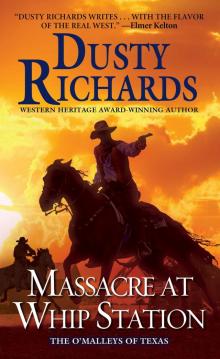 Massacre at Whip Station
Massacre at Whip Station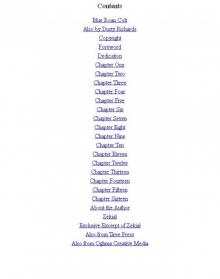 Blue Roan Colt
Blue Roan Colt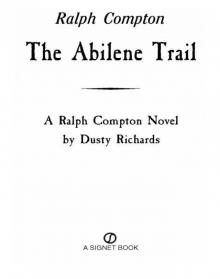 The Abilene Trail
The Abilene Trail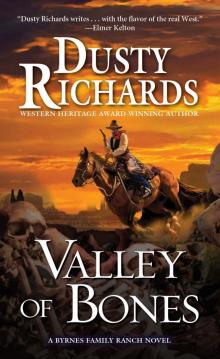 Valley of Bones
Valley of Bones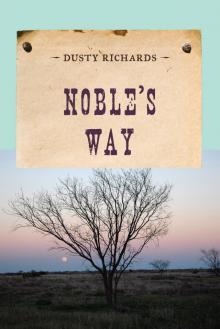 Noble's Way
Noble's Way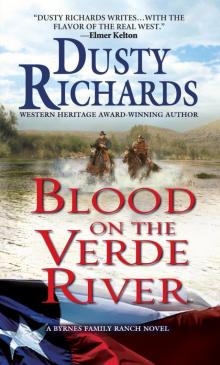 Blood on the Verde River
Blood on the Verde River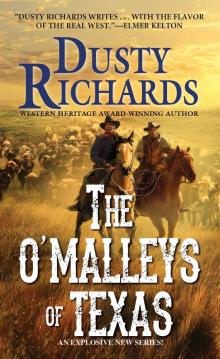 The O'Malleys of Texas
The O'Malleys of Texas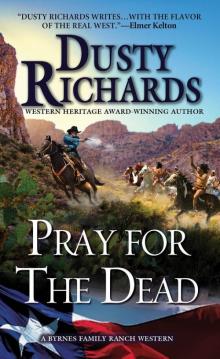 Pray for the Dead
Pray for the Dead Arizona Territory
Arizona Territory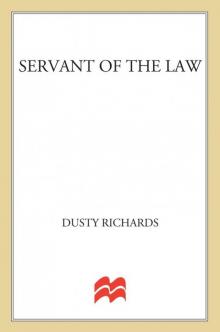 Servant of the Law
Servant of the Law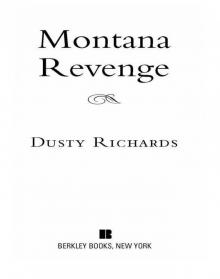 Montana Revenge
Montana Revenge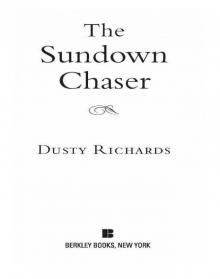 The Sundown Chaser
The Sundown Chaser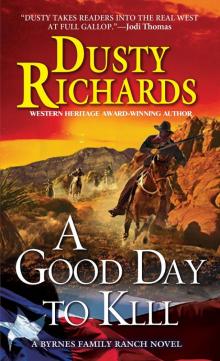 A Good Day To Kill
A Good Day To Kill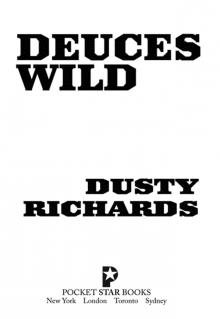 Deuces Wild
Deuces Wild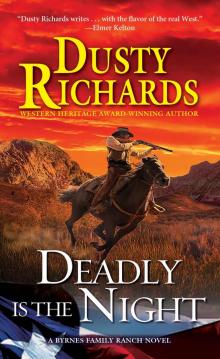 Deadly Is the Night
Deadly Is the Night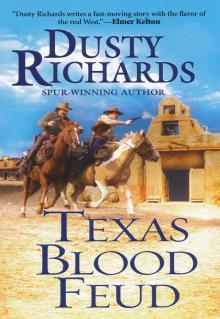 Texas Blood Feud
Texas Blood Feud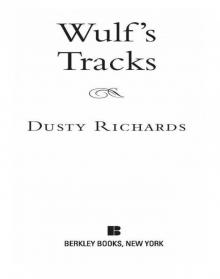 Wulf's Tracks
Wulf's Tracks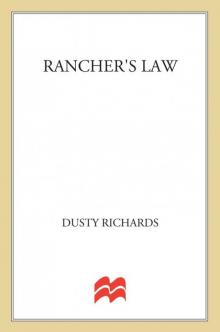 Rancher's Law
Rancher's Law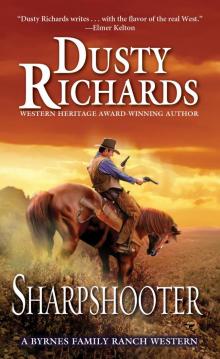 Sharpshooter
Sharpshooter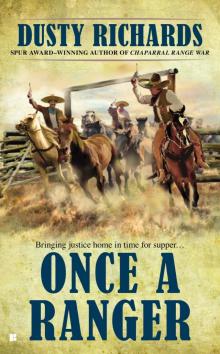 Once a Ranger
Once a Ranger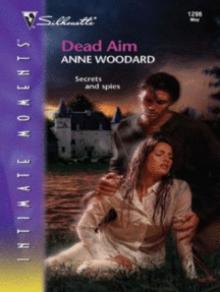 Dead Aim
Dead Aim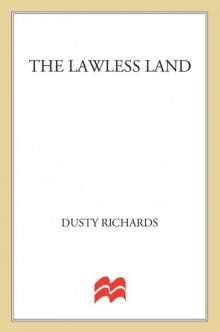 Lawless Land
Lawless Land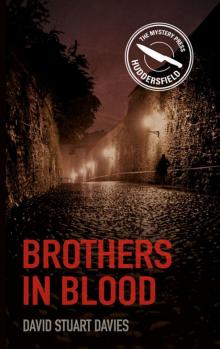 Brothers in Blood
Brothers in Blood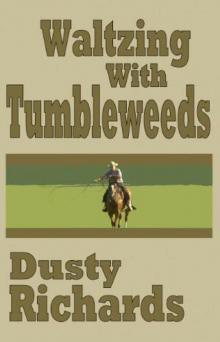 Waltzing With Tumbleweeds
Waltzing With Tumbleweeds